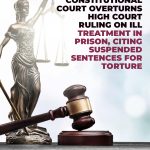
18/1/2017 EXPENDITURE OF “SOCIAL BENEFIT FUNDS” FROM THE STATE BUDGET NEEDS TO BE INVESTIGATED
18/01/201729/1/2017 ON THE DRAFT LAW ON AMENDMENTS TO THE CRIMINAL CODE: NO STRONGER PROTECTION FOR JOURNALISTS & FREE SPEECH REGARDING JUDICIARY AT RISK
29/01/201722/1/2017 CONSTITUTIONAL APPEALS ON ACCOUNT OF POLICE TORTURE IN ‘JEWELLERS’ STREET’
Human Rights Action (HRA) filed constitutional appeals for Branimir Vukčević and Momčilo Baranin, victims of police torture that took place in the so-called Jewellers street in Podgorica on the night after 24 October 2015 political protests.
Vukčević and Baranin were brutally beaten by members of the police force, while the State Prosecutor’s Office failed to ensure effective investigation. Fifteen months later and not a single perpetrator identified.
The Constitutional Court is requested to establish violation of the human right to freedom from torture and order an investigation in accordance with European standards.
By filing these constitutional appeals, HRA wishes to draw attention to the responsibility of the State Prosecutor’s Office to implement effective investigations of police torture, on the one hand, as well as duty of the police to cooperate with the above institution, on the other. In this case, as in the case of police torture of Milorad Martinović, state authorities did not undertake an investigation in accordance with European standards because they failed to effectively take all reasonable steps to identify perpetrators. Whether this is due to the bias of the State Prosecutor’s Office in favour of the police or lack of capacity for other reasons, the result is the same – terrifying violation of the absolutely protected human right to freedom from torture.
We do not want to move past the fact that the police forces citizens – through no fault of their own – to lie on the pavement, be insulted, humiliated, kicked, beaten, and that afterwards the state prosecution fails to ensure that police officers be identified and sanctioned for such criminal behaviour.
HRA is determined to persevere in this case – if the Constitutional Court does not uphold the appeal, we will file an application before the European Court of Human Rights. We believe that the struggle to achieve the rule of law in Montenegro lies in the essence of this case. HRA is currently drafting a constitutional appeal for Milorad Martinović on the same basis as well.
More detail on constitutional appeals
Vukčević and Baranin were beaten by several police officers in Podgorica capital centre in Miljana Vukova street (so-called Jewellers’ street) on 24 October 2015, around 10:30 p.m., after breaking up a protest organized by Democratic Front political coalition. The two victims did not participate in any incidents, they did not resist the police officers, the police did not arrest them, and no procedure was initiated against them. Baranin and Vukčević were forced that night by the police force members to lie down on the sidewalk, who then inflicted several blows to the men, causing them extensive hematoma, as later established in a medical report. In addition, they were subject to inhuman and degrading treatment because the police officers shouted at them, insulted them and then left them to lie in the street, injured and without help. A video recording of the events in question has also been published. To date, more than a year later, the responsible police officers were not identified, and the case is still in the pre-trial phase.
The appeals insist that the investigation was ineffective, because it was not independent, impartial, thorough or prompt. Also, the victims have not been appropriately included in the investigation, contrary to the European Convention on Human Rights.
The investigation was not independent because the Basic State Prosecutor’s Office in Podgorica entrusted the identification of the perpetrators to the same body whose members had committed the abuse. Even if only the members of the Special Anti-Terrorist Unit were responsible for the abuse, they are in the end subject to the same chain of command – the top of the Police Directorate – as well as the policemen who were to identify the perpetrators. Thus, an independent investigation in accordance with European standards has not been ensured.
The investigation was not thorough because the prosecution failed to take all reasonable steps to secure evidence in the investigation. For example, although the appellants provided detailed depositions to the Basic State Prosecutor’s Office describing the police officers’ uniforms, their location and vehicles, and stated that those officers had talked to them, i.e. addressed them several times, the prosecutor’s office did not take actions to identify these officers or confront them with the victims, it did not question the Special Anti-Terrorist Unit members, who, according to the appellants, had been mainly involved in their torture. Moreover, Basic State Prosecutor’s Office failed to obtain a video recording of events from daily Vijesti and invite the author of that recording to provide additional information about the events that he had watched from a window and partially captured. Despite warnings from both the victims and non-governmental organizations advocating for human rights, the prosecutor’s office remained passive, only occasionally urging the Police Directorate to identify the perpetrators of abuse, even though it was an obligation of precisely this state body to ensure effective investigation in line with national laws and international standards.
The Basic State Prosecutor’s Office has taken a passive, subordinate position to the Police Directorate, whose officers, i.e. some of them were committing criminal acts of abuse, while others were actively concealing the perpetrators of these crimes. Not only did the State Prosecutor’s Office fail to convince concerned citizens that it is willing to respect and ensure the rule of law in the case in question concerning executive authority officials of a relatively low rank, it also called into question the willingness of the state and its prosecutorial organization to cope with potential perpetrators of crimes in the state administration ranked much higher.
The investigation was not prompt, because the Basic State Prosecutor’s Office heard the appellants only more than a month after the incident, about which the public had been informed only a day later by several media. Also, all that followed after 3 December 2015, when the victims gave their testimonies to the prosecutor’s office, until the filing of the constitutional appeals last week, does not indicate that the investigation met the minimum standard of urgency.
The appellants were not adequately involved in the investigation as they were provided information only on their own initiative; after they stopped making inquiries six months ago nobody provided any information to them.







 English
English